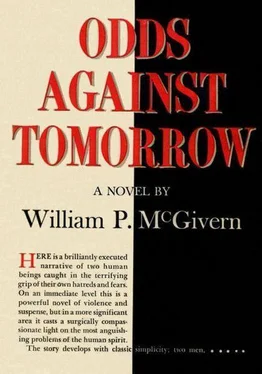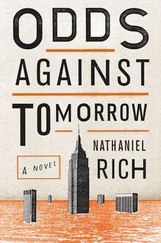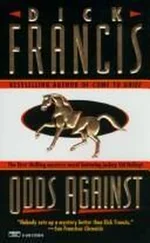“So what about him?” Earl’s eyes narrowed dangerously. “What about him, Sambo?”
“He was from Scotland,” Ingram said, still staring steadily at the anger in Earl’s face. “He was about sixty. He liked music. He asked me if I’d like to go to a concert with him the next day. I said fine. We went to the concert. Next day he took me and a buddy of mine around London. Out to neighborhoods where there were row after row of little brick houses with flower gardens in front of them. Then he took us to Piccadilly, and then to the East End where the people were so poor they never used up their Scotch and gin rations. All the little pubs had Scotch and gin. He knew a lot about history. He told us that an Englishman named Disraeli once said, ‘The good things in life are for the few — the very few.’ The Scotchman didn’t like that idea. He dropped us at Paddington Station and we caught the train back to our outfit.” Ingram let his penknife fall to the table. “That’s the story of the people of England.”
“Well, why did he pick you up? Was he queer?”
“You couldn’t prove it by me.”
“And how about the girls? How about the shack jobs, Sambo?”
Ingram shifted his eyes from Earl’s face. He couldn’t face the senseless anger there. Why? he thought bitterly. Why should I have to apologize for what my body did ten years ago? “I’ll tell you this much,” he said, suddenly contemptuous of himself and contemptuous of Earl. “I never took anything in England that wasn’t offered to me. On a platter.”
“A great war you had. You weren’t in the Army, you were in heaven.”
“They gave me a soldier suit and put me on a ship. What was I supposed to do? Jump overboard and swim to the front lines with my rifle in my mouth?”
Earl stood and limped back to the windows, embittered and consumed by his restless anger.
“You should have tagged along with me, Sambo,” he said. “You’d have seen the war. I left the States a Pfc. Four years later I was platoon sergeant. There were only about a dozen guys in our outfit that made the trip the whole way. The rest were shot up in Africa or France or Germany. Anytime they got overstocked with Purple Hearts they’d send us back to the line.”
“You were with the First, I guess.”
“You heard about it, eh?”
“Sure. That was one of the real Glory outfits.”
“You’re frigging right it was.” He limped up and down the room, inflated with belligerent pride. “They took the greatest bunch of guys in the world to make that outfit, then killed half of them to make a name for it. You know something? Every officer we left the States with was killed in action. The CO, his exec, four second looies. All killed in action.” Earl moved to the sofa, feeling suddenly confused and weary. His mood was changing, softening; the cold knot of anger in his breast seemed to be melting. “One of our second lieutenants was just a kid,” he said shaking his head slowly. “A guy named Murdock. He played football at Santa Clara. God, he was a hell of an athlete. He had everything. Good-looking, a big grin on his face all the time. He was never discouraged about things. He was an optimist, I guess you’d call him. He kept everybody cheered up. He got hit in France. A bullet went right through his helmet, in the back, out the front. When we turned him over a couple of guys started swearing — it was just wrong to see him busted-up like that.”
Earl had forgotten Ingram, forgotten the bitterly cold room with its medicinal stink, forgotten that he would die if the police caught him; everything was crowded from his mind by proud, painful memories of the Army. It had been the best time of his life. There was no doubt of that. With all the mud and crap, the best time he’d ever known.
He’d griped about it then, like everybody else, because he had been ashamed to admit what he really felt. Even combat was different for him than for the other guys. It made him wild and giddy, but it wasn’t like fear at all; it was a roller-coaster feeling, almost too exhilarating to bear. That’s why he’d yelled and shouted like a madman at times. Just to release the thing...
They had put together five big years, marking them with graves that stretched all the way back to Africa. They were an outfit, something you gave to and took from at the same time, something bigger than just one hundred and fifty foot soldiers. Then the outfit broke up and the guys scattered all over the country. And there was never a postcard or a telephone call from any of them, never a way to keep the memories alive. It was like the whole thing never happened.
Once, in Davenport, Iowa, Earl had met a man from the outfit — Hilstutter, a tough, savvy sort of guy, a good soldier. Hilstutter hadn’t changed; he was a little fatter, that was all. They stood talking on the sidewalk, Hilstutter nodding at him and saying, “Yeah, that was a bad night,” or “What ever happened to So-and-so, I wonder” — nodding as Earl talked on eagerly, recalling some of the big times in the Army. And then Hilstutter had said, “You haven’t changed, Sarge. You look great.” And he’d shaken hands after that and glanced at his watch. Had to get rolling, he said. Had to get home to his wife...
And that was all. Earl had stared after him, watching the dumpy little man hurry off down the sidewalk, looking just like any one of a thousand guys you’d see in a crowded city. After soldiering together five years that’s all it meant to Hilstutter: a hello, a hand shake, a good-by.
The real outfit was dead, he thought gloomily. The dead ones had made the outfit’s record — the silent dead of the old First. It was funny, the dead ones kept the memories alive. The others didn’t count. Scattered all over the country, watering lawns, growing fat and bald, forgetting the whole damned thing as soon as they got their discharge papers in their hands.
Ingram’s hands were still; he was watching the pain and confusion in Earl’s face, wondering about the man. He said at last, “How did you get the Silver Star?”
Earl looked at him curiously. “How did you know about that?”
Ingram dug around in his overcoat pocket and pulled out Lorraine’s car keys. The Silver Star gleamed brightly on his brown palm. “I figured it was yours,” he said.
“You figured right,” Earl said, nodding a little. He was silent for a few seconds, a humorless smile twisting his lips. Then he shrugged and fumbled for the pack of cigarettes.
“We got caught in the basement of a German farmhouse that night,” he said. “Six of us. We thought it was a good place to hole up, but the Germans came back with tanks and cut us off. They moved their company headquarters right into the house. We could hear ’em talking up above us, getting food ready, posting details. I didn’t know what to do. We talked it over and decided to wait until dawn, then slip out a basement window and crawl through the Krauts to our own lines.” Earl lighted his cigarette, remembering the smell of root vegetables in the basement, the slick muddy floor and the growling sound of German voices above their heads. He laughed. “We made it too, out the window, through the yard and into an orchard. Everybody was on his own, taking off at half-minute intervals. It was just like a field problem. But only five of us made it — one guy was missing, a big clodhopper replacement who’d just been with the outfit a week. I didn’t even know his goddam name. Monroe or Morgan or something like that. He was always picking his nose and stamping his feet.” Earl shook his head. “You know the kind of guy? Useless. But I had to go back and get him. I found him about ten feet from the house, huddled on the ground, too scared to move. Frozen there like a big pile of crap. I practically had to drag him back. But this time our luck was no good. A guard heard us and started shouting. They all began yelling then and flashing torches around — you know Krauts blow sky-high if you take ’em by surprise. Greatest soldiers in the world when everything’s going according to the book. But when things snafu they act like a bunch of crazy women. Anyway, I got this Morgan into the orchard and started shooting back. The trees were pretty good cover. Morgan or Monroe or whatever in hell his name was made a run for it and got hit. I kept moving from tree to tree and firing and the Krauts never charged. They must have figured we were a recon section. I picked up Morgan — that was his name, I guess — and dragged him back to our lines. And that was it.” Earl drew deeply on his cigarette, then threw it at the fireplace. “So they gave me the medal.” He stood up feeling bitter and ill at ease. “That and a dime buys a cup of coffee, I guess you know.”
Читать дальше

![Уильям Макгиверн - Завтра опять неизвестность [английский и русский параллельные тексты]](/books/35168/uilyam-makgivern-zavtra-opyat-neizvestnost-angli-thumb.webp)









